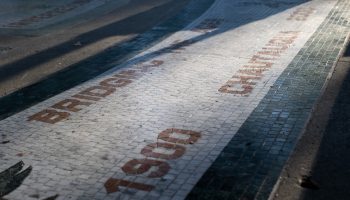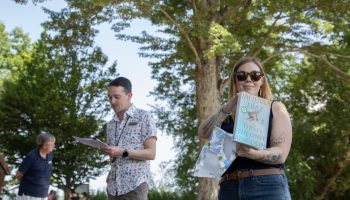
For Stefan Bindley-Taylor, experimenting with language is not just a creative choice — it is a bridge between cultures.
“One of the things I was playing around with in my writing this year was Trinidadian dialect,” he said. “… (The Chautauqua Janus Prize) felt like a great place to submit the piece.”
The spirit of linguistic exploration earned the Trinidadian-American writer the 2025 Chautauqua Janus Prize for his surreal, emotional and deeply human short story, “Bread, Meat and Water.”
The Chautauqua Janus Prize celebration, situated at the end of a week commemorating the Chautauqua Literary and Scientific Circle Class of 2025, will commence at 5 p.m. today in the Athenaeum Hotel parlor. Now in its eighth year, the Janus Prize celebrates an emerging writers’ short piece of fiction or nonfiction that upsets convention and expands readers’ imaginations, and is made possible by a generous donation from Barbara and Twig Branch.
Bindley-Taylor is a writer, educator and musician currently pursuing his Master of Fine Arts at the University of Virginia. His work has been published in several outlets, including The Brooklyn Rail, NY Carib News and adda magazine. He was a finalist for the 2023 PEN Emerging Voices Fellowship and winner of the 2025 DISQUIET Flowers Fellowship and 2024 Brooklyn Caribbean Literary Festival Prize.
Born in Maryland to Trinidadian parents, Bindley-Taylor writes from the in-between.
“I travel (to Trinidad) every year, and most of my family is still out there, so I try to write from a space that is often of tension — being in the States while having this heritage, but kind of being in the midst of blending the two,” Bindley-Taylor said.
Blending two cultures into a single powerful short story won Bindley-Taylor the prize out of a record-breaking 210 submissions. Chautauqua Literary Arts and the Department of Education narrowed down the submissions to a list of 11 bold finalists, and then turned to 2025 guest judge and Week Seven Writers’ Center faculty Marita Golden to select a winner. For Golden, the decision was not an easy one.
“(The finalists) were very bold and brave and dealt with a lot of issues that we’re grappling with in our society today — emotional dislocation, AI, dramatic changes in the workplace, what work even means, as well as universal stories of family and grief,” Golden said.
As she sifted through submissions, she put an emphasis on stories that not only unsettled convention but tapped into sentimentality and feeling.
“I was looking for stories that affected me emotionally and also evidenced mastery of craft as they told a particular story,” Golden said. “So it was a combination of the emotional impact of a story and the craft used to tell a story.”
Bindley-Taylor’s work exceeded Golden’s expectations, using a “symphony of voices” to depict a story that employs surrealism to depict love, grief and family.
“He had a mastery of both more conventional craft aspects and more experimental (aspects), so it was a perfect mix, and it deeply touched me,” Golden said. “I think we read stories to be touched. We read stories to be moved.”
As the recipient of the prize, Bindley-Taylor will spend a week in Chautauqua, attending the opera and the cinema with his partner, attending Golden’s Writers’ Center workshop titled “All Stories True” and dedicating time to organizing his upcoming short-story collection to which “Bread, Meat, and Water” belongs.
“I’m definitely going to be spending a lot of time staring at these stories on the floor, shuffling around pages, crossing out words and probably losing my mind,” Bindley-Taylor said. “There’s going to be some tweaks that need to be made, but getting back up and making the tweaks will make it a better collection in the end.”
He plans on using the $5,000 prize money toward pitching his manuscript of short stories and looks forward to the celebration and ceremony today for more reasons than one.
“It’s my mother’s birthday. She’ll be in the crowd, so I got to do her proud,” he said. “That’s my favorite subtext of the day. I’m really happy to be getting to do that with her here.”
The event will open with a conversation between Golden and Bindley-Taylor, and he looks forward to reading and discussing his story and highlighting his place in a broader literary lineage of diasporic writers.
“I think we are in a moment where a lot of diasporic authors are playing around with a different style than our predecessors,” he said. “I think it’s a rich moment to see what comes out of it, and I want to be a part of that.”




